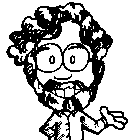Digital Technologies, Education, and a More Equitable Society
This recoding and text were prepared by Mitchel Resnick for a course on Digital Citizenship and Literacy, organized in Uruguay.
Will digital technologies lead to a more equitable society — or will they worsen the inequities in today’s society? It all depends on how we use the technologies.
Unfortunately, many school systems are introducing digital technologies in ways that reinforce traditional educational approaches — and reinforce traditional inequities. Too often, school use new technologies to deliver instruction to the student, or deliver information to the students. This delivery approach to education will not help students develop the creative-thinking, collaboration, and communication skills that they need to thrive in today’s fast-changing society.
In our Lifelong Kindergarten group at the MIT Media Lab, our work is based on a very different model of education and learning. We develop technologies and activities that engage all students, from all backgrounds, in creative learning experiences — where they work on projects, based on their passions, in collaboration with peers, in a playful spirit. For example, with our Scratch programming language and online community, students can create and share animated stories and games, based on their own interests. With Scratch, all students from all backgrounds can learn how to express themselves creatively and work collaboratively — essential skills for everyone in today’s society.
The choice is ours. Do we want to use new technologies to reinforce traditional approaches to education and learning? Or do we want to use new technologies to empower all students, from all backgrounds, to create, collaborate, experiment, and explore, so that they can be full and active contributors to today’s society. We are at a crossroads. Let’s choose wisely.
